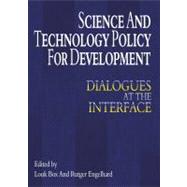Science and Technology Policy for Development
, by Box, Louk- ISBN: 9781843312277 | 1843312271
- Cover: Hardcover
- Copyright: 6/1/2006
This book is about changing social relationships. The authors focus on the question of what social relations make for successful science and technology policies. In particular, the various chapters illustrate what happens at different social interfaces, such as between policy makers and researchers, and between the users and producers of knowledge. In other words, they are interested in the knowledge networks that are emerging between the many different actors involved in the development of science and technology.Science and Technology Policy for Developmentis the outcome of a workshop that brought together scholars and policy makers from the global South and the North, from private and public organizations, to review their experiences. What unites the authors is a common concern for researchpolicy linkages. In this context, research was taken to mean any systematic effort to increase the stock of knowledge, and ls"policyrs" as any purposive course of action followed by an actor or set of actors. Linkages are seen as the communication and patterns of interaction among the actors involved. Such patterns may consolidate into knowledge networks in which information is evaluated or prioritized. A number of authors stress the communication aspect of such patterns, especially in the form of dialogue between actors or, through them, between institutions like ministries, universities or companies. The subtitle of this book reflects this orientation:Dialogues at the Interfacerefers to communication between these different institutions. A must read for students of development economics, professionals in the sector and policy-makers alike.






